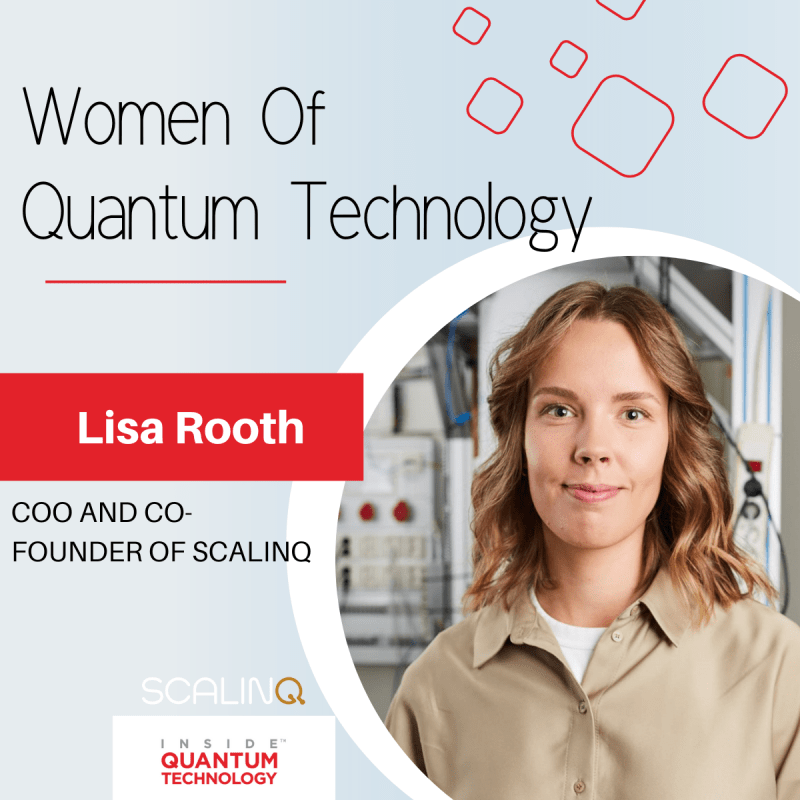Women of Quantum Technology: Lisa Rooth of SCALINQ

With both a business and technology background, people like Lisa Rooth, co-founder and COO of SCALINQ, find the science and entrepreneurship of quantum computing to be fascinating. “Originally I was an engineer,” Rooth explained. “And then I studied business and worked for different startups and scale-ups.” As the quantum industry is not only proving to be an area for technological breakthroughs but also good business strategies, Rooth and others find a deep sense of belonging in being able to easily connect technology and business into a successful venture.
Having a passion for startups, Rooth was naturally drawn to the quantum industry. “I used to work in clean technology, and what got me excited about that was the potential impact that the technologies I was working with could have,” Rooth stated. “Then when I learned about quantum, with vastly larger impact across industries, and the kind of effects it could have on society, that sparked my interest.” Rooth used her passion to help found SCALINQ, which spun off from research done at Chalmers University of Technology, Gothenburg. Rooth was originally brought into the company by an acquaintance at the department. “They essentially said: ‘These researchers seem to be on to something, but they need someone to help them look into the commercial aspects,'” Rooth said. “So, my colleague Zaid and I started with this as a side project. Then we got a lot of great feedback for the solution that SCALINQ had and heard the need for other solutions like it. So, we had no option but to form a business around it.”
But forming a company in a rather new industry like quantum computing was far from easy. According to Rooth: “Naturally, there’s a big threshold and a big learning curve in getting into quantum technology in general. Especially since it’s still so heavily research-based compared to other industries.” Yet, after SCALINQ formed, Rooth found her new role of COO hadn’t changed that much. “You still have the same work to be done with customers and partners and distribution channels. It’s just the technology and how it’s being used that’s very different,” she added. “In other industries, you’re selling things that already exist, in a market that is established, but here, we are a part of transforming that and building that. What I think is cool about quantum technologies is you have a chance to be a part of it. It’s a movement, not just an industry.”
With her love for startup companies, Rooth enjoys her day-to-day activities as COO. “As a founder of a startup, you wear a lot of hats, depending on the month or even the day,” she said. “I do a lot of the operations. But due to my expertise and background, I focus on go-to-market strategies and customer exploration.” Using her business and commercial background, Rooth can help determine customer needs and solutions. With her market research, she’s found quite a few things. “The investments are coming in, not just public funding from governments, but also from private actors,” she said. “And it just really shows what kind of growth we have ahead of us.” This growth excites Rooth, and she thinks that now is the time to join or invest in the quantum industry.
Rooth believes that to achieve this growth, more diversity in what types of skills people have is essential. “I think up until now, a lot of the time you would have a quantum physicist, or at least scientists, and you would train them in business or sales, or even marketing,” explained Rooth. “But we are now, just like all other industries, attracting people who are good at marketing and teaching them about the technology. I think we are now transitioning from being a research field to becoming a commercial, established industry.” But Rooth also believes that we need to look at other technological industries as examples of what not to do when it comes to diversity. According to Rooth: “If we look at conventional computing, we know that there are a lot of issues we can avoid when we build up this industry, such as stereotypes and education not being accessible to all. I think a lot of people have realized this already, as there are several programs and initiatives to help traditionally underrepresented groups in tech get into the quantum industry, such as Women in Quantum, Girls In Quantum, QubitxQubit, Womanium, and others.”
Besides these initiatives, Rooth thinks there are a few practical things companies can do to create a diverse and inclusive workplace. “But there are also a lot of small and easy things we can all do as well. No matter what field you’re in, you can ensure your job postings are written in a more inclusive way, you can use recruitment tools to avoid biases when hiring, and you can carefully evaluate the culture you are building and question whether someone with a different background than yourself would like it as much—and gender is just one aspect of that.” For her, quantum startups, like SCALINQ, should start thinking about diversity as soon as possible. “Another thing I discussed recently with a group of quantum startups is when should we start looking at diversity because, as a startup, you already have a lot on your plate. Well, we would hope the answer is always, but it should at least be with the mindset: the sooner, the better. I myself encountered a company with around 20-25 employees, all white men. Sadly, I would hesitate to even apply to their company, and I should be used to that, having only worked in male-dominated fields my entire career. But being the only one different in a team of 5 or 10 people is a bit different, as the culture is still being shaped. But at a certain size and with a lack of diversity, it can be a red flag for the talent you are trying to attract. So I encourage startups not to wait too long with this. It doesn’t take a lot of work to do, but does make a significant difference.”
Kenna Hughes-Castleberry is a staff writer at Inside Quantum Technology and the Science Communicator at JILA (a partnership between the University of Colorado Boulder and NIST). Her writing beats include deep tech, the metaverse, and quantum technology.





















